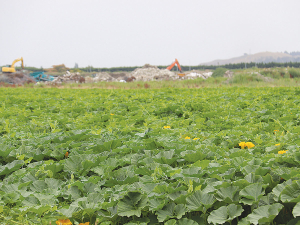New Zealand apple and pear harvest 2026 signals standout season
Early forecasts for New Zealand's apples and pears point to a standout season marked by exceptional fruit quality and high pack-out rates.
 Some growers have planted vegetable crops like squash to improve the fertility of the soil, with a view to planting new apple trees in the future.
Some growers have planted vegetable crops like squash to improve the fertility of the soil, with a view to planting new apple trees in the future.
NZ Apples and Pears market manager Danielle Adsett says Hawke’s Bay lost 610 hectares of apple trees out of a total of 6500 hectares.
She told Hort News that this is a huge loss of production and it will take a few years to get back to pre-Gabrielle days. But she adds that the 610ha figure may be an under representation of what has actually happened.
This figure is based on blocks totally destroyed, and Adsett says this doesn’t take account of blocks that were partially destroyed. She explains that some trees in such blocks may be pulled out or it’s possible that in the end orchardists may decide to pull out all the apple trees and start again.
According to Adsett, not all the 610 hectares of land on which apple trees were planted then wiped out by Cyclone Gabrielle will be lost forever.
She says there are some areas such as Esk Valley where it’s unlikely trees will be planted again, but other badly damaged orchards will likely be re-planted as the soil is still fertile.
Driving around the region there are signs of orchardists trying to get their damaged land back into operation. Some, for example, have planted vegetable crops to improve the fertility of the soil, with a view to planting new apple trees in the future.
But behind some of the shelter belts, the devastation of a year ago is still evident, with uninhabitable houses, piles of wood and other debris being cleaned up by diggers.
There are also signs of some apple trees trying their best to produce a crop but not really succeeding, and they look stressed so may need replacing.
“There have been a lot of new plantings in Hawke’s Bay and while some of these were lost in the cyclone, there is the hope that new plantings will come on stream in the future, but this will require considerable investment,” she says.
Adsett says Cyclone Gabrielle cost the region in the order of $200 million in terms of lost income and says it’s too early to say how much the 2024 crop will redress that figure.
On the positive side, a packhouse destroyed by the cyclone has been rebuilt and will be open for business for this season.
As far as growers are concerned, Adsett believes there is an air of optimism, due to the better-than-expected crop of apples that is now on the trees. She says that growers are positive about the markets that are buying New Zealand apples, including those new apple varieties which are proving very popular with consumers.
New DairyNZ research will help farmers mitigate the impacts of heat stress on herds in high-risk regions of the country.
Budou are being picked now in Bridge Pā, the most intense and exciting time of the year for the Greencollar team – and the harvest of the finest eating grapes is weeks earlier than expected.
The Real Estate Institute of New Zealand (REINZ) has released its latest rural property report, providing a detailed view of New Zealand’s rural real estate market for the 12 months ending December 2025.
Rural retailer Farmlands has released it's latest round of half-year results, labeling it as evidence that its five-year strategy is delivering on financial performance and better value for members.
OPINION: "We are back to where we were a year ago," according to a leading banking analyst in the UK, referring to US president Donald Trump's latest imposition of a global 10% tariff on all exports into the US.
DairyNZ says the Government’s proposed Resource Management Act reform needs further work to ensure it delivers on its intent.

OPINION: A mate of yours truly reckons rural Manawatu families are the latest to suffer under what he calls the…
OPINION: If old Winston Peters thinks building trade relations with new nations, such as India, isn't a necessary investment in…